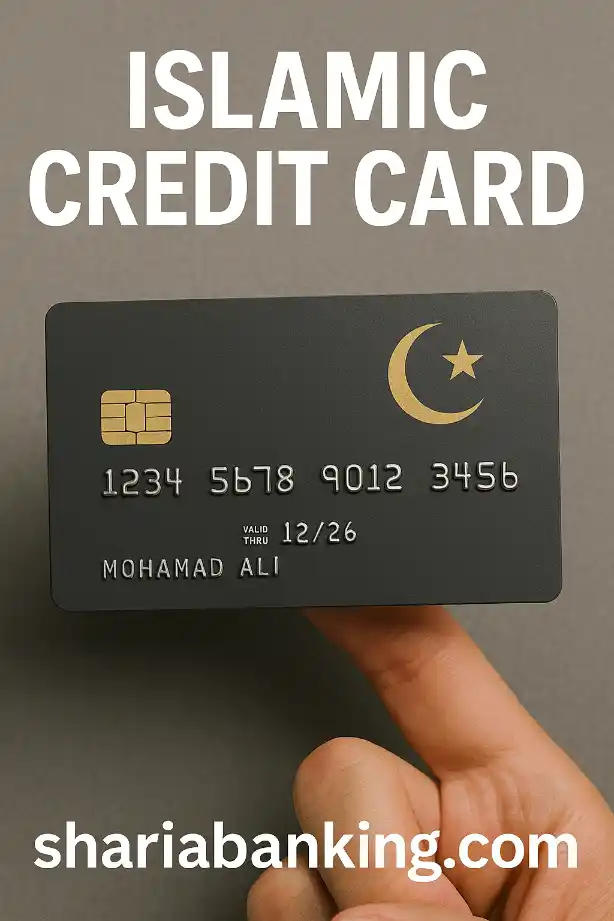
What is an Islamic credit card ?
An Islamic credit card is a Shariah-compliant payment instrument that allows cardholders to make purchases, withdraw cash, or access financial services without involving riba (interest).
Islamic credit cards are structured using permissible contracts such as ujrah (fee-based services), murabaha (cost-plus sale), or ijarah (leasing); the goal is to provide the convenience of modern card usage while ensuring that transactions adhere to Islamic principles.
At the core of an Islamic credit card is the prohibition of riba. Instead of accruing interest on unpaid balances, the issuing bank earns revenue through transparent charges, such as an annual fee, fixed service fees, or a pre-agreed profit margin on specific transactions.
<!—wp:paragraph –>
The halal credit card has another defining feature is the emphasis on ethical use of funds; Islamic credit cards are not permitted to be used for financing activities deemed haram, such as gambling, alcohol, or other prohibited industries.
How does an Islamic credit card works ?
Here’s a clear, step-by-step of how an Islamic credit card works. I’ll show the most common tawarruq (commodity-murābaḥah) model first, then the alternative ujrah (fee-based/charge-card) model.
A) Tawarruq / Murābaḥah model (most common in GCC & many markets)
-
- Apply & get a limit. You sign a Shariah contract pack; the bank sets your credit limit and shows fees, profit rate, and late-payment charity rules.
-
- You buy at a store. The network (Visa/Mastercard, etc.) authorises the purchase; the bank pays the merchant (just like a normal card).
-
- During the cycle: Your transactions accrue but no profit is charged yet; you still have a grace period until statement due date.
-
- Statement is issued. It shows: total due, minimum due, and the grace-period due date.
-
- If you pay in full by the due date: You’re done—no profit is charged.
-
- If you choose to revolve (pay less than full): The bank executes a tawarruq equal to the amount you’re rolling over:
-
- Bank buys a commodity spot, then sells it to you on deferred murābaḥah at cost + disclosed profit for the next period.
-
- You (or the bank as your agent) sell the commodity spot for cash to settle the prior balance.
-
- Result: you now owe a fixed sale price (principal + profit) for that period—not interest.
-
- If you choose to revolve (pay less than full): The bank executes a tawarruq equal to the amount you’re rolling over:
-
- Repayments. Each month you pay the deferred murābaḥah amount (or revolve again with a new tawarruq on the unpaid portion). There’s no compounding interest—each month’s profit is fixed at sale.
-
- Late payment. A penalty goes to charity (taʿzīr)—the issuer cannot keep it as income (administration costs may be netted).
-
- Cash advances. Either not allowed or run as a separate tawarruq with a clearly priced, fixed-profit transaction (no interest).
-
- Shariah controls. Prohibited transactions (e.g., alcohol, gambling) may be blocked; rewards are given as permissible gifts (hibah); investments of float follow Shariah screens; an independent Shariah board audits the setup.
B) Ujrah / fee-based (charge-card-style) model (common in Malaysia)
-
- Apply & get a limit; you agree to a service (ujrah) fee schedule and repayment terms.
-
- Make purchases; the bank pays merchants as usual—your usage is treated like a qard (interest-free advance).
-
- Statement & due date; you must pay in full by the due date (often no revolving).
-
- Fees, not interest; the issuer earns only the disclosed service fees (and network interchange), not time-based interest on balances.
-
- If late: a charity penalty may apply; issuer doesn’t profit from it.
Where can I apply for an Islamic credit card ?
Here’s a list of banks / issuers & countries where Islamic-credit-card / Sharia-compliant credit card services are available (or Islamic banks operating credit/card products). This isn’t exhaustive but covers many of the known ones.
Banks / Issuers & Their Countries
| Country | Bank / Issuer |
|---|---|
| UAE | First Abu Dhabi Bank (FAB) – Islamic cards. FAB UAE |
| UAE | ADCB Islamic Banking – Islamic credit cards. ADCB |
| Pakistan | Standard Chartered Saadiq – e.g. Saadiq Platinum Credit Card. Standard Chartered Bank |
| Malaysia | Multiple: Bank Islam, CIMB Islamic, HSBC Amanah, Maybank Islamic, Public Islamic Bank, RHB Islamic etc. |
| Kuwait | Boubyan Bank – an Islamic bank issuing credit cards. |
| Oman | Alizz Islamic Bank – retail, credit cards among its products. |
| Pakistan | Faysal Bank – fully Islamic bank, credit cards / card-services offered. |
| Brunei | Bank Islam Brunei Darussalam (BIBD) – Islamic financial services, including cards. |
| Bosnia & Herzegovina | Bosna Bank International (BBI Banka) – Islamic banking incl. credit/debit card services. |